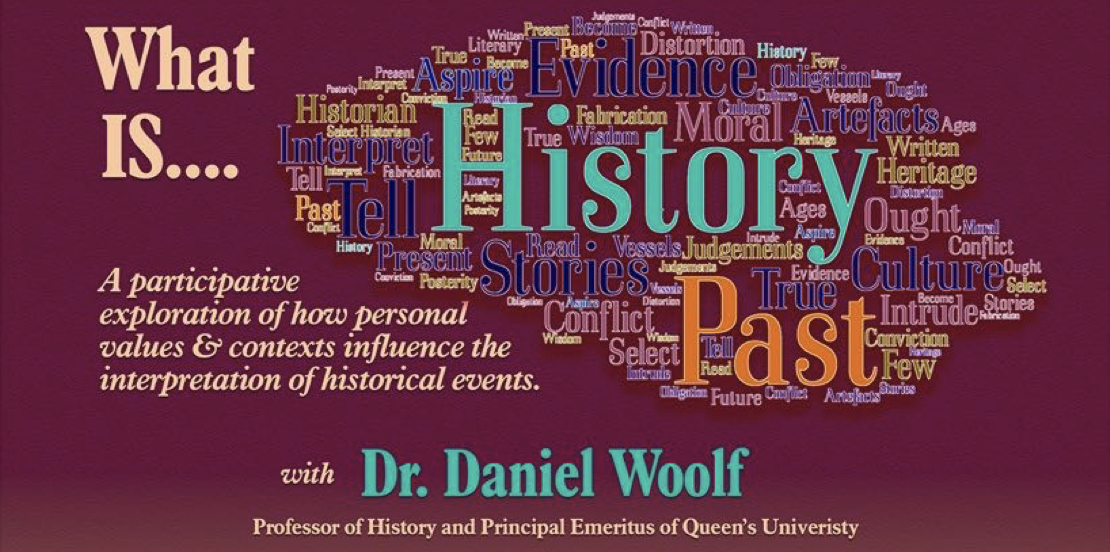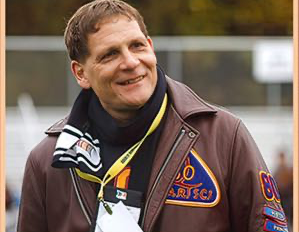What is History?


~ Report by Myra McFarlane ~
March, 2022
The past doesn’t change, but does history? And if it does, so what?
Those were the central questions Dr. Daniel Woolf led us through at our meeting of March 16th.
Employing an interactive format, and taking advantage of the best of Zoom technology, members were treated to about 90 minutes of stimulating discussion about what history really is, and about how we as community historians interact with that “thing” we call history.
Luckily, we also ended up with some ideas about what WE could be thinking of as we do our own history.
Setting the tone with a discussion of the three key questions noted below, the group pretty quickly came to consensus that history and the past just aren’t the same thing.
- Is history the same as the past?
- Is the past directly accessible to us? If so, in what form?
- Is history “what happened” or what we believe happened based on our best good faith assessment of the fragmentary traces of the past?
With that consensus as the basis for our understanding, we then went on to explore notions of how we access the past, and how we interpret relevant information - Margot Belanger said it best when she said: “history is in the eye and the mindset of the beholder.” If that is the truth, then is anything sacred? According to Dr. Woolf, historians will change their minds about past events based on several criteria, including, but not only: new evidence, new interpretations of old evidence, different approaches (e.g. asking a different question about an artefact), and of course the bias and contextual understanding of the historian at the time they are doing their research.
For this writer, the idea that history depends as much on the historian as the “facts” that the historian chooses to see and try to understand, contributes to a vague sense of disequilibrium - which of course is the basis of openness to learning, the place where historians begin, with a question.
This disequilibrium extends to the idea of the “causal chain”. According to Dr. Woolf, the more complex an event, the more difficult it is to pinpoint an actual cause or series of causes, hence the idea of the “causal chain.” What caused an event is often subject to spirited discussion, and never completely resolved! Few things are absolute, in this interpretation of history.
In an interesting interrogation of the relationship of history to memory, Dr. Woolf had us think about events that we may have lived through, comparing what we remembered of those events to what the current historical record has to say about them. Examples shared included artifacts, discussion about the assassination of President Kennedy, the Viet Nam War, and others. In each case, the group felt that the memory would only form a part of the historical record. Of course, this has resonance for RTHS because of the oral history work that we do. A framework for considering the relationship of memory to history can be based on work which categorizes memory as collective, group, or individual. And of course, if our perception of events changes over time, why can’t perceptions of history?
With these key points as our own context, we then broke into smaller groups to consider three questions:
- How do you balance what the evidence says with what people think they know?
- Should a history of your community reflect existing beliefs about what was important, or ask new questions that reflect modern concerns?
- To what degree should a community history be respectful of sensitivities even to the point of “sugar coating” episodes from the past, or omitting them?
Each group reported in turn; and what happened was a sort of consensus about some of the ethical dilemmas local historians face. A well-developed case in point is how the historians of Manotick have tended to treat the legacy of Moss Kent Dickinson, the founder of Manotick, as ably put forward by Bill Tupper.
We have no solutions, but a series of considerations that may serve to guide us in future. This is, according to Dr. Woolf, “the minefield where history and memory collide”.
As RTHS moves forward in our work of documenting the history of the former Rideau Township, we will have lots to think about in our own practice.
Thank you, Dr. Woolf, for a stimulating and thought provoking discussion. You have opened the door to an elevation of our discourse.
